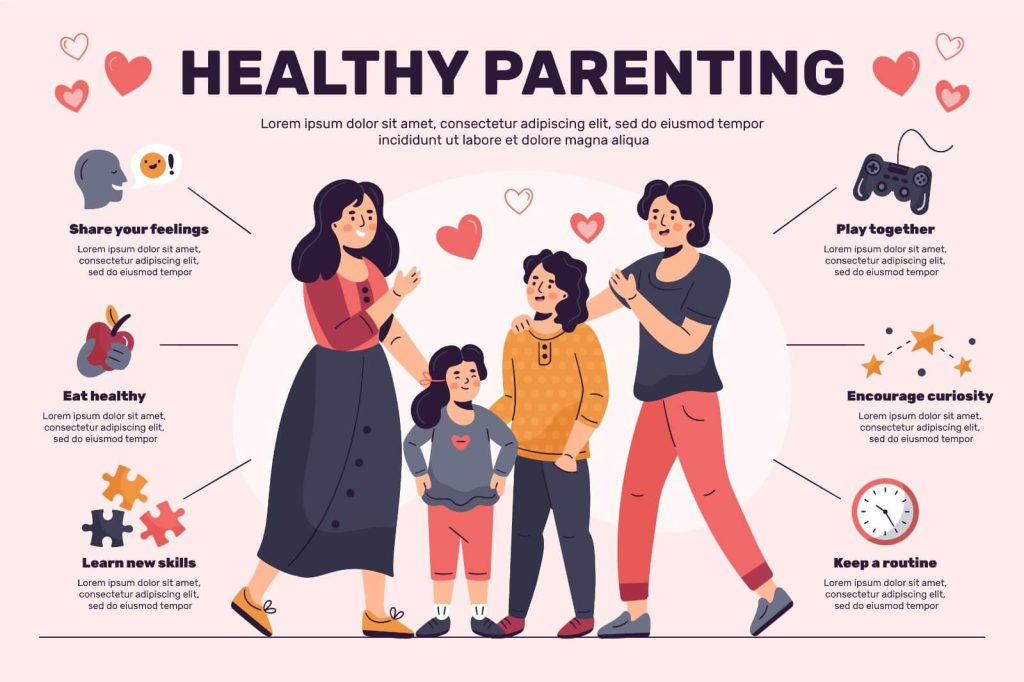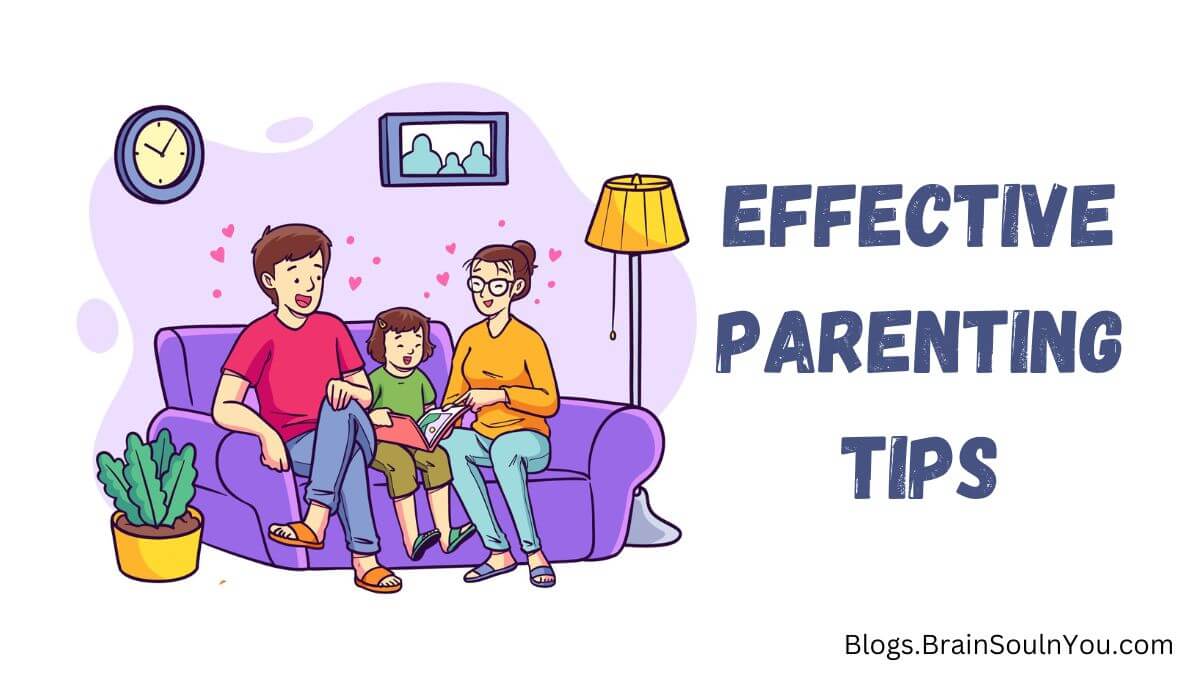Parenting is the most important topic in the life of every parent. That’s why it becomes necessary to know about effective parenting tips.
It focuses on developing independence in children, so redundancy becomes a goal for parents.
This includes a style that considers the age and developmental stage of the children. That is, there is a match between expectations, discipline, and resilience-building strategies and the children’s developmental age.
It develops a growth mindset in children and not a mindset that says a child’s intelligence is fixed. Parenting that develops a growth mindset links children’s success to effort and strategy, rather than to recognizing and developing purely natural potential.
What is Parenting?
Parenting refers to the process of raising a child from childhood to adulthood. It includes the physical, emotional, social and intellectual care and guidance provided by parents or primary caregivers. Parenting involves a wide range of responsibilities, interactions and decisions intended to support the healthy development and well-being of the child.

Effective parenting involves providing love, care, and a safe environment for a child to grow and thrive. It encompasses various aspects, including:
Nurturing and Emotional Support: Providing love, affection, and emotional support to help children feel secure and develop a positive self-image. This includes expressing warmth, empathy, and understanding.
Meeting Basic Needs: Meeting a child’s basic needs for food, shelter, clothing, and healthcare, ensuring their physical health and well-being.
Setting Boundaries and Discipline: Establishing clear and consistent rules, boundaries, and expectations for behavior. Disciplining children fairly and appropriately teaches them values, self-control, and responsibility.
Education and Intellectual Stimulation: Promoting a child’s intellectual development by encouraging curiosity, providing educational opportunities, and engaging in stimulating activities that support their learning and cognitive growth.
Role Modeling: Acting as positive role models for children by demonstrating desirable values, behaviors, and attitudes. Parents’ actions and interactions serve as powerful influences on a child’s development.
Communication and Guidance: Maintaining open and effective communication with children, actively listening to their concerns, and providing guidance and support when needed. Effective communication helps build trust, fosters healthy relationships, and promotes emotional well-being.
Encouragement and Support: Encouraging children to explore their interests, develop their talents, and pursue their goals. Providing support, guidance, and encouragement helps children build confidence, resilience, and a positive sense of self.
Instilling Values and Morals: Teaching children ethical and moral values, such as kindness, honesty, respect, and empathy. Helping children develop a sense of right and wrong and guiding them to make responsible choices.
Promoting Social Skills: Teaching and modeling appropriate social skills, empathy, and conflict resolution strategies. Encouraging children to develop healthy relationships, respect diversity, and navigate social interactions.
Monitoring and Supervision: Ensuring children’s safety and well-being by monitoring their activities, providing appropriate supervision, and creating a secure and supportive environment.
Parenting styles can vary based on cultural, personal, and situational factors. Effective parenting involves finding a balance between nurturing and setting boundaries, promoting independence while providing support, and adapting to a child’s individual needs and developmental stage.
Parenting is an ongoing learning process, and no one is a perfect parent. Each child and family is unique, and parenting requires flexibility, adaptability, and continuous effort to meet the evolving needs of children as they grow and develop. Seeking support, guidance, and information from reputable sources can help parents navigate the challenges and joys of raising children.
10 Effective Parenting Tips
Effective parenting involves a combination of love, guidance, and consistent support. Here are some tips that can help promote positive parenting and enhance the parent-child relationship:
1. Show Unconditional Love: Express love, warmth, and affection to your child consistently. Let them know they are valued and accepted for who they are, regardless of their achievements or behaviors.
2. Practice Positive Communication: Maintain open and honest communication with your child. Listen attentively to their thoughts, feelings, and concerns without judgment. Use positive and encouraging language when interacting with them.
3. Set Clear Boundaries: Establish age-appropriate rules, expectations, and limits for behavior. Be consistent in enforcing these boundaries while providing explanations and guidance on why they are necessary. Balance firmness with flexibility when appropriate.
4. Encourage Independence: Foster your child’s independence by allowing them to make age-appropriate choices and decisions. Encourage them to take responsibility for their actions, problem-solve, and learn from mistakes.
5. Be a Positive Role Model: Set a good example by demonstrating the values and behaviors you wish to see in your child. Children learn through observation, so model empathy, respect, honesty, and good communication skills in your own actions.

6. Practice Effective Discipline: Use discipline strategies that are appropriate for your child’s age and temperament. Focus on teaching and guiding rather than punishment. Encourage positive behavior through praise, rewards, and reinforcement.
7. Spend Quality Time Together: Dedicate regular one-on-one time with your child to engage in activities they enjoy. This promotes bonding, strengthens the parent-child relationship, and creates opportunities for open communication.
8. Foster a Safe and Supportive Environment: Create a safe and nurturing physical and emotional environment for your child. Encourage open expression of thoughts and feelings without fear of judgment or criticism.
9. Support Learning and Growth: Encourage your child’s intellectual, social, and emotional development. Provide opportunities for learning, exploration, and creativity. Support their interests and help them set and achieve goals.
10. Take Care of Yourself: As a parent, prioritize self-care and personal well-being. Take breaks, manage stress, and seek support when needed. Your own well-being directly impacts your ability to be an effective parent.
Types of Parenting Styles
There are several recognized types of parenting styles that reflect different approaches to raising children. These parenting styles are based on the balance between parental responsiveness (warmth, support, and sensitivity) and parental demandingness (structure, discipline, and control).
Here are some types of parenting styles:
Authoritative Parenting
Authoritative parents are warm, responsive, and supportive while also setting clear expectations and limits for their children. They establish rules and guidelines but also encourage independence and individuality.
They use reasoning and explanations to guide their children’s behavior and are open to discussion and negotiation. Authoritative parents tend to foster self-discipline, self-esteem, and social competence in their children.
Authoritarian Parenting
Authoritarian parents are high on demandingness and control but low on responsiveness. They have strict rules and expectations and enforce them without much room for negotiation or flexibility. Authoritarian parents may rely on punishment and discipline rather than explanation and reasoning.
This parenting style often emphasizes obedience and conformity. Children raised with authoritarian parenting may develop low self-esteem, have difficulty with decision-making, and may become either overly compliant or rebellious.

Permissive Parenting
Permissive parents are highly responsive and nurturing but have low levels of demandingness and structure. They are lenient in setting rules and limits, allowing their children a great deal of freedom and independence.
Permissive parents may avoid conflict and tend to prioritize their children’s happiness and desires. However, the lack of structure and guidance can lead to difficulties with self-control, boundaries, and a sense of entitlement in children.
Uninvolved/Neglectful Parenting
Uninvolved parents have low levels of both responsiveness and demandingness. They provide minimal supervision, guidance, and emotional support to their children. Uninvolved parents may be emotionally detached, neglectful, or overwhelmed by other life circumstances.
This parenting style can have severe negative effects on children’s emotional and social development, leading to feelings of neglect, low self-esteem, and behavioral problems.
Well-done Parenting
Well-done parenting refers to an approach that emphasizes positive and effective parenting strategies to promote the healthy development and well-being of children. It involves creating a nurturing and supportive environment, establishing clear boundaries, providing guidance, and fostering a positive parent-child relationship. Here are some key elements of well-done parenting:
Unconditional Love and Acceptance: Express love, warmth, and acceptance to your child, emphasizing that their worth is not dependent on their achievements or behaviors. Show them that you love them for who they are, regardless of their successes or failures.
Positive Reinforcement: Use praise, encouragement, and rewards to reinforce positive behavior and efforts. Acknowledge and celebrate your child’s achievements, big or small, to boost their self-esteem and motivation.
Effective Communication: Maintain open and honest communication with your child. Listen actively to their thoughts, feelings, and concerns without judgment. Use age-appropriate language and engage in meaningful conversations to help them express themselves and develop good communication skills.

Consistent and Clear Boundaries: Set clear and consistent rules, expectations, and consequences for behavior. Ensure that your child understands the boundaries and the reasons behind them. Consistency helps children feel secure and understand what is expected of them.
Active Involvement: Be actively involved in your child’s life. Show interest in their activities, hobbies, and schoolwork. Attend their events, spend quality time together, and engage in activities that they enjoy. This involvement fosters a strong parent-child bond and promotes their overall development.
Emotional Support: Provide emotional support and validation to your child. Help them understand and express their emotions healthily. Teach them coping skills and problem-solving strategies to navigate challenging situations.
Role Modeling: Be a positive role model for your child. Demonstrate the values, behaviors, and attitudes you want them to emulate. Your actions speak louder than words, so strive to model kindness, empathy, respect, and integrity.
Individualized Approach: Recognize that every child is unique and has their own strengths, weaknesses, and needs. Tailor your parenting approach to meet their individual needs, taking into account their personality, temperament, and developmental stage.
Lifelong Learning: Continuously educate yourself about child development, parenting strategies, and effective communication techniques. Stay informed about the challenges and issues that children may face at different ages. Seek support from parenting resources, books, workshops, or professionals when needed.
Self-Care: Take care of your own well-being and prioritize self-care. Parenting can be demanding, and it’s essential to nurture your own physical, mental, and emotional health. By taking care of yourself, you can better support and care for your child.
Well-done parenting is an ongoing process that requires patience, understanding, and adaptability. Remember that no parent is perfect, and mistakes are opportunities for growth and learning. By practicing positive and effective parenting strategies, you can foster a healthy and nurturing environment for your child’s growth and development.
Safety Net Parenting
Safety net parenting refers to a style of parenting that emphasizes creating a safe and secure environment for children while providing them with a sense of protection and support. It involves prioritizing the physical and emotional safety of children and ensuring they have a stable and reliable support system. Here are some key aspects of safety net parenting:
Physical Safety: Safety net parents prioritize the physical well-being and safety of their children. They take measures to create a safe home environment, childproofing the house, and implementing safety precautions to prevent accidents and injuries.
Emotional Security: Safety net parents focus on fostering emotional security for their children. They provide a nurturing and loving environment where children feel safe to express their emotions, ask questions, and seek comfort and reassurance. They offer a listening ear, empathy, and emotional support.

Boundaries and Structure: Safety net parents establish clear boundaries and structure for their children. They set age-appropriate rules and guidelines to provide a sense of predictability and consistency. These boundaries help children feel secure and understand what is expected of them.
Reliable Support: Safety net parents provide a reliable support system for their children. They are there to offer guidance, advice, and assistance when needed. They establish open lines of communication, allowing children to seek help and support without fear of judgment or punishment.
Consistency and Reliability: Safety net parents strive to be consistent and reliable in their parenting approach. They follow through on their commitments, honor promises, and provide a stable and predictable environment. This consistency helps children feel secure and builds trust.
Emotional Resilience: Safety net parents foster emotional resilience in their children. They teach them coping skills, problem-solving strategies, and emotional regulation techniques to navigate life’s challenges. They encourage independence and provide opportunities for their children to develop resilience and adaptability.
Open Communication: Safety net parents maintain open and honest communication with their children. They create a safe space for children to express themselves, share their concerns, and ask questions. They listen attentively, validate their feelings, and provide age-appropriate explanations and guidance.
Empowerment and Autonomy: Safety net parents empower their children to make decisions, solve problems, and develop their independence. They encourage age-appropriate autonomy and allow children to take risks within safe boundaries, fostering self-confidence and decision-making skills.
Monitoring and Supervision: Safety net parents keep a watchful eye on their children’s activities and social interactions. They monitor their child’s online presence, friendships, and extracurricular activities to ensure their safety and well-being.
Supportive Discipline: Safety net parents use discipline strategies that prioritize teaching and guidance rather than punishment. They focus on helping children learn from their mistakes, understand the consequences of their actions, and develop self-discipline and accountability.
Safety net parenting is about creating a nurturing and protective environment that promotes a child’s overall well-being and development. It involves providing the necessary support and security while empowering children to grow, explore, and develop independence.
Monkey See Monkey Do
The phrase “monkey see, monkey do” is an idiom that suggests that individuals, particularly children, tend to imitate or mimic the actions, behaviors, or attitudes of others, especially those they look up to or observe closely. It implies that people often learn by observation and imitation, similar to how monkeys might imitate the actions of other monkeys.
In the context of parenting and child development, the phrase highlights the importance of being a positive role model for children. Children observe and learn from the behaviors and actions of their parents, caregivers, and other significant individuals in their lives. They are likely to imitate what they see, both the positive and negative aspects.

As a parent or caregiver, it is essential to be mindful of your own behaviors and actions because children are highly influenced by them. Children are more likely to adopt behaviors and attitudes they witness regularly. Therefore, if you want your child to develop positive habits, values, and behaviors, it is crucial to model those behaviors yourself.
By setting a good example, and displaying kindness, empathy, respect, and integrity, you create a positive influence that can shape your child’s behavior and character. Conversely, if negative behaviors or attitudes are consistently demonstrated, children may imitate those as well.
To promote positive imitation and learning in children:
- Be conscious of your actions: Consider the behaviors and attitudes you display in front of children and strive to exhibit positive ones.
- Communicate and explain: Engage in open and age-appropriate communication with children, explaining the reasons behind certain behaviors or actions. This helps them understand the context and develop a deeper comprehension.
- Encourage positive role models: Surround children with positive role models and influences, such as family members, friends, or mentors who exemplify desirable behaviors and values.
- Provide guidance and feedback: Offer guidance and constructive feedback to children when they exhibit behavior that requires correction. Explain the desired behavior and provide them with tools to improve.
- Foster a supportive environment: Create an environment that encourages positive behavior and supports personal growth. Celebrate achievements and provide encouragement and support when children make efforts to exhibit positive behaviors.
Remember that children are always watching and learning, so being a positive role model can have a profound impact on their development and behavior.
Contact Brain Soul & You for parenting counseling
Love,
Saurabh Goel
Read more blogs on 17 Psychological Tricks To Read Anyone Instantly, 12 Ways to Practice Mindful Eating and Intuitive Eating, 21 Mind Traps
Saurabh Goel
He is the Founder and CEO of the Training and Counselling Company ‘Brain Soul & You’. He is an NLP Wellness Coach, Life Coach, Brain analyst, and Trainer for Education, Corporate, and Entrepreneurship. For more than 7 years, he delivered presentations on entrepreneurship, mind programming, and motivation. He did his B.tech in IT and later choose to be a successful psychologist. He is helping people in various ways through his counseling and training sessions.


